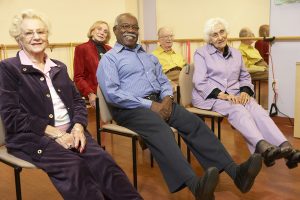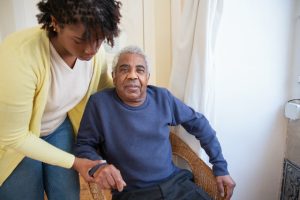Guest Blog: How Technology is Changing Elderly Care
 Applying new technologies to in home senior care has significantly contributed to the quality of life by enhancing their daily living needs such as transportation, communication, health, and social participation. Telemedicine, voice command technologies, blood pressure cuffs, remote glucose monitors are some of the few technologies that have impacted elderly care. This article discusses various ways in which technology is changing elderly care.
Applying new technologies to in home senior care has significantly contributed to the quality of life by enhancing their daily living needs such as transportation, communication, health, and social participation. Telemedicine, voice command technologies, blood pressure cuffs, remote glucose monitors are some of the few technologies that have impacted elderly care. This article discusses various ways in which technology is changing elderly care.
Technologies are filling the caregiver gap
There is a massive growth of the elderly population which has increased the demand for caregivers. According to research by AARP, there will be about 50 million caregivers in the US by 2020, 45 million of them being unpaid family members. At the same time, there will be 120 million people in need of a caregiver. Many companies have therefore used their knowledge to create technologies that have smoothen caregiver’s work. These technologies have been designed to solve or ease various elderly needs, such as keeping track of their daily activities, medication, exercise programs, and monitoring meals.
Devices prevent wandering
Seniors with dementia and Alzheimer’s disease always need to escape a situation because they are confused or disoriented. These diseases common in the elderly erase their memory-making familiar places to be unfamiliar. These cognitive impairments make the elderly lose direction and could apt walk to dangerous places. In an aged care facility, to be precise, the seniors wander because of inactivity or boredom. Wandering gives caregivers and relatives an alarm for fear that the senior will get hurt or get lost. To address this problem, several devices have been developed, and they include bed and door alarms.
Some pendants provide GPS for the elderly, especially those under medication and prone to getting lost. Some of these apps with GPS location include angel sense, GPS Smart sole, MedicAlert safely home, and others are still under development by HCI (Human-Computer Interaction) experts.
Cameras that protect the elderly from abuse
Due to other duties you need to attend to, it is impossible to stay around nursing the aged. Small cameras are one of the most significant ways to ensure that the older person is adequately cared for. You will have to place cameras in indiscreet locations. This camera will take footage of daily activities, and thus you will be able to know that the caregiver you hired or some family members are not mistreating your elderly loved ones.
Remote technology offers 24/7 protection
Caregiving from a distance has always had innumerable challenges. Senior safety tech industries have made life easy for caregivers by developing caregiver alert systems and elderly monitoring systems. There are different options to ensure that the elderly is safe and in good health while you are away. Monitoring devices used include:
- Sensors that turn off stoves if they are left for too long.
- Sensors to inform you if the elderly left the water running.
- Locked medication dispensers equipped with alarms and timers for missed doses.
- Voice-activated virtual assistants.
- Intelligent sensors that learn the elderly routine.
Smartphones to promote self-care
Smartphones are handy for seniors. It helps them stay connected with their grandchildren by video chatting, controlling other intelligent devices, monitoring health through pastern, and lots of features that improve the quality of life for the elderly.
Other benefits of smartphones to the seniors include:
- Making emergency calls.
- Using GPS to navigate when driving or walking.
- Accessing the internet.
- Looking at date and time.
The top features of a senior smartphone include:
- Simple menus.
- Larger buttons and screens.
- Emergency button.
- Fitness and health tracking tools.
Smartphones can serve the purpose of entertainment to seniors. Seniors can now break boredom through games, audiobooks, podcasts, and social media. This is mainly for those who are living alone. They also come pre-installed with a virtual assistant that responds to voice commands and questions.
In addition to the above technologies, the best way to avoid the elderly being mistreated is to hire a caregiver whose background check has been thoroughly conducted. Some online platforms specialize in this area, for instance, Caregiver, engaging in home-care services for the seniors. They provide the simplest and most effective way to find the right caregiver for your loved ones. In short, Caregiver empowers you to find the best in-home senior care.
Conclusion
Technology advancements have influenced how family caregivers and health care providers approach eldercare. It has bridged the caregiver gap and allowed seniors to age gracefully. These technologies have provided a mechanism for caregivers to assess the health of the elderly and provide appropriate medication.




